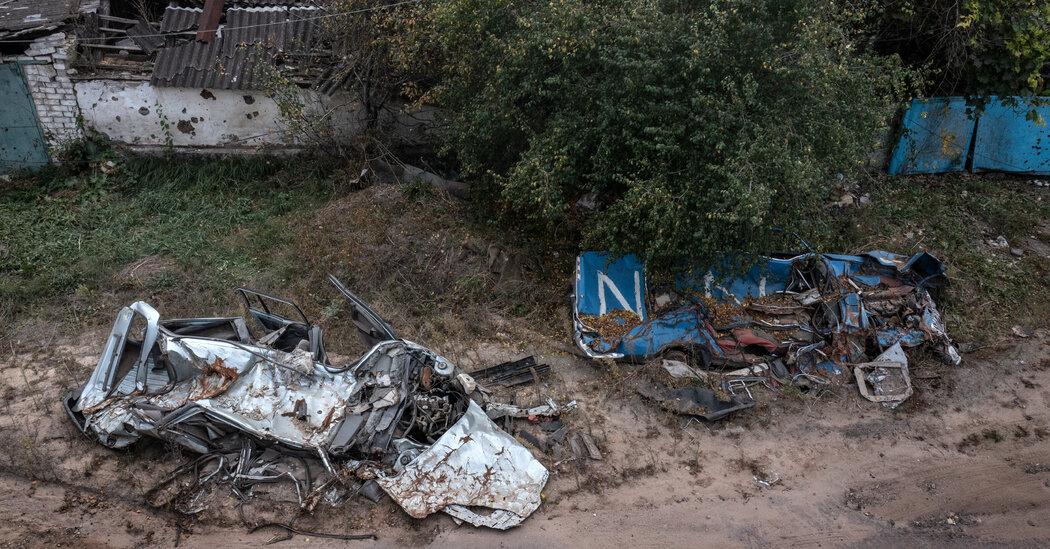Nearly all of the European Union’s highest diplomats met in Ukraine’s battered wartime capital on Monday, convening a surprise summit to reassert the bloc’s commitment to Ukraine against Russia’s invasion and to rebut concerns that some countries’ support might be waning.
The foreign ministers came from 23 of the European Union’s 27 members, and were joined by representatives from the four remaining countries, Poland, Hungary, Latvia and Sweden. The bloc’s top diplomat, Josep Borrell Fontelles, said the meeting, which was unusual for being held outside the European Union’s borders, was a signal of the bloc’s unflagging support.
“This meeting,” Mr. Borrell told reporters in Kyiv, “should be understood as a clear commitment of the European Union to Ukraine and its continuous support in all dimensions.”
Russia’s attack on Ukraine roused the European Union into an run of unified action that was extraordinary for the often fractious bloc. Over 18 months, the nations imposed 11 rounds of economic sanctions on Russia, provided training for the Ukrainian military and, for the first time in the bloc’s history, gave funding for lethal weapons among its billions of euros in support.
Addressing the foreign ministers, President Volodymyr Zelensky of Ukraine acknowledged that his country relies heavily on aid from abroad. He said that Ukraine would prevail against Russia, but that “our victory explicitly depends on our cooperation.”
He later said on X, formerly known as Twitter, that the meeting had “proved unity in support for Ukraine.”
But the West’s sustained backing for Ukraine has not come without strains, as member nations have struggled to reckon with the war’s economic consequences and to maintain political unity at home. In Slovakia, a Russia-friendly party, whose leader vowed “not to send a single cartridge” of ammunition to Ukraine, won in a national election over the weekend.
In Poland, the government is embroiled in a dispute with Ukraine over grain exports, and the ruling party, facing a knife-edge vote later this month, is trying to reassure voters it will not put Ukraine’s interests above those of Polish citizens. Poland said last month that it would not send any additional weapons once it fulfills its current commitments.
Even in the United States, the E.U. ally that has sent the most aid to Ukraine, Congress passed a stopgap government funding bill over the weekend without more aid for Ukraine, after some Republicans contested its inclusion.
Mr. Borrell on Monday said that E.U. diplomats were keen to keep Ukraine’s backers unified, including in Washington.
“Maybe it’s not being seen like this for everybody around the world, but for us Europeans, it’s an existential threat,” he said of Russian aggression. “And that’s why we have to continue supporting Ukraine, and discussing with our American allies and friends, for them, too, to continue supporting.”
The timing of continued aid could prove important for Kyiv, which is facing difficult months ahead: It is waging a grueling counteroffensive to retake land in its south and east, and defending against long-range Russian shelling near and far from the front.
A Russian bombardment in the eastern Kherson region killed at least one person and injured six others, including two children, local officials said on Monday. Russian forces fired nearly 400 shells into Ukrainian-controlled areas of the region, damaging buildings including a kindergarten, a church and an ambulance station, a local Ukrainian military official, Oleksandr Prokudin, said on Telegram.
“Another difficult night and morning for the Kherson region,” Mr. Prokudin said. “The enemy covers the peaceful settlements of the region with fire.”
Though E.U. members have taken extraordinary steps to help Ukraine on the battlefield — including sending tanks and fighter jets — they have resisted Ukraine’s calls to accelerate or ease the long and demanding process for any country to join the bloc itself. Mr. Borrell acknowledged on Monday that the “strongest security commitment” the bloc could give would be E.U. membership.
He, like other European officials, has welcomed Ukraine broadly but without concrete details. “Ukraine’s future lies within the E.U.,” he said on social media ahead of the meeting.
The European Union gave Ukraine a path to membership last year, but a candidate country has to fulfill numerous detailed criteria and align its laws with the bloc’s regulations, a process that usually takes several years.
The bloc is expected to decide in December whether to allow Ukraine to open negotiations with the European Union, the next step in the process and one which would require the unanimous backing of all 27 member states.
Mr. Borrell also expressed hope that member nations would, before the end of the year, approve a further 5 billion euros, or $5.3 billion, in military support for Ukraine, with “more to come.”
Similarly, Ukraine’s supporters in Washington — which include members of both parties in Congress — have also expressed hope that they can secure more money in the weeks ahead.
Karine Jean-Pierre, the White House press secretary, told reporters that President Biden has repeatedly talked to the leaders of other countries in the past about supporting Ukraine.
“The president as you know, was able to bring more than 50 countries to continue to show their support for Ukraine as our partners and allies,” she said Monday. “That alliance is as strong as it’s ever been and so that commitment is going to continue.
And in a rare moment of agreement, Ukrainian and Russian officials said they do not expect American support to dry up soon.
“America will continue its involvement in this conflict,” the Kremlin’s spokesman, Dmitri S. Peskov, said on Monday, adding that “exhaustion” over the conflict would eventually mount in the United States and other countries.
Russia’s deputy foreign minister, Sergei A. Ryabkov, called the congressional negotiations “nonsense” and “just a performance for the public.”
“Interparty squabbles are one thing, and support is another thing,” he told reporters. “They will find the money.”
Vivek Shankar contributed reporting from Seoul, and Michael D. Shear from Washington.


